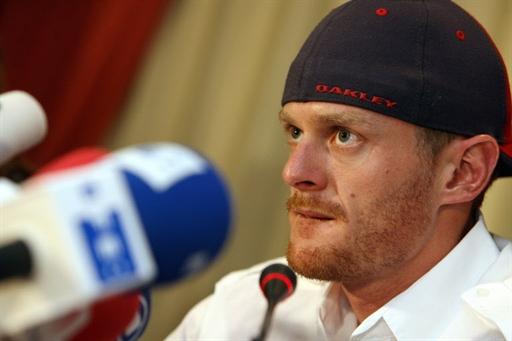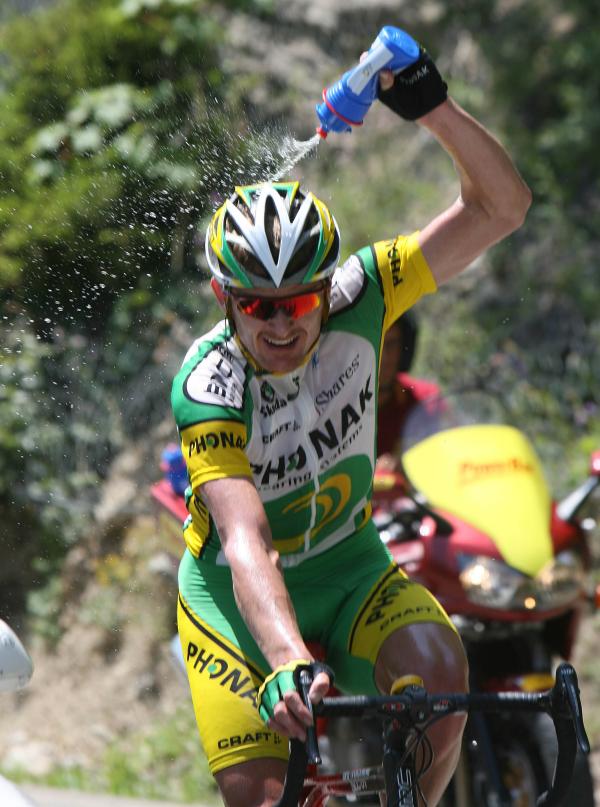Landis: It was either cheat or get cheated
American tells his story of doping to Kimmage
The latest race content, interviews, features, reviews and expert buying guides, direct to your inbox!
You are now subscribed
Your newsletter sign-up was successful


Floyd Landis has repeated details of how he doped while riding with Lance Armstrong's US Postal Service team in 2002 and at Phonak in 2006 when he won the Tour de France in a long feature interview with Paul Kimmage in the Sunday Times.
The interview lasted a reported seven hours but focuses on Landis's own story rather than the detailed allegations he made after confessing in the spring of 2010.
Kimmage details how Landis decided to dope while attending a training camp in 2002. He was desperate for money after the folding of the Mercury team and desperately wanted to be part of Armstrong's Tour de France squad.
The Sunday Times reveals that Landis went to St Moritz for a training camp in May. There, Landis doped for the first time, applying testosterone patches to help his recovery, and a half litre of blood was extracted before being re-infused during the Tour de France. Armstrong went on to win that Tour, his fourth, and Landis earned $50,000 in prize money and picked up a $40,000 bonus.
Landis accepts it was his own decision to dope but claims he the widespread cheating in the sport at the time made him choose between either 'cheat or get cheated.' He chose the first, and as Kimmage writes, he became part of the 'Brotherhood of the Needle.'
"I've tried to explain this a hundred times," he is reported as saying in the Times. "But it always comes out sounding like I am either blaming someone or trying to justify what I did. I don't point fingers. Nobody forced me to do what I did."
"If I had any reason to believe that the people running the sport really wanted to fix it, I may have said, 'If I wait long enough, I'll have my chance to win without doping.' But there was no scenario in my mind where I was ever going to get the chance to race the Tour de France and win clean. There was no good scenario. It was either cheat or get cheated. And I'd rather not be the guy getting cheated."
The latest race content, interviews, features, reviews and expert buying guides, direct to your inbox!
Landis refused to admit he doped even after he was told he had tested positive after his 2006 Tour de France victory. He was in denial and tried to bluff his way through the accusations. He even stuck to his story when his best friend and father in law David Witt committed suicide. He finally cracked when his lawyer called him to tell him they had lost the case. He was facing a two-year ban for doping and would never be considered the winner of the 2006 Tour de France.
He smashed his Tour winner's trophy and symbolically smashed his façade of lies and denials.
"I had walked by that thing a hundred times, and every single time I wanted to smash it. and so I just grabbed it. I felt better for about five minutes and didn't ever regret it. It represented a turning point in my life where I had to lie, and I didn't want to lie, not like that. That wasn't me," he told Kimmage.
Landis wanted to change and says he had dreams about Witt, winning stage 17 of the Tour de France to Morzine with a solo attack and how the media surrounded his mother's house after it was revealed he had tested positive. Yet he kept lying, even in front of his father who travelled to his arbitration hearing.
He split up with his wife Amber and moved to their log cabin in the hills southern Californian Mountains. He thought that racing again would help but he also turned to drink.
"I had this idea that I would feel better once I started to race again, but I didn't," he told Kimmage. "Some days I was okay and I would race okay, and other days I just didn't like who I was. I felt like I was completely disconnected from the world, like I was looking at things from the outside, just watching them happen. I couldn't think forward, that was too much, or think backward, but I knew that nothing that happened in front of me could hurt me."
"I had a few drinks every day for quite some time, and it got to the point where I realised I had to stop. I went to some therapy and realised I was just trying to avoid thinking again, except that this time I was using alcohol rather than riding my bike. The process of talking to somebody helped. I realised, 'I am not going to be all right if I've got to keep living like this. I'm not going to be all right if I just keep avoiding it. I can't go back and make it different. I can't change the facts.'"
Landis is now 35 and is reportedly $80,000 in debt. He has been largely ostracized by the sport and has been attacked by those he has accused and others in the peloton. Despite his problems, Landis is striving to find personal happiness.
"My parents were right about a lot of things," he said. "At some level, whatever life you live, you have to accept things before you can be happy - whether that's having very little, like they prefer, or having everything. Until you are content with what you've got, you are always chasing something, or running from something, neither of which is good.
"I'm stuck in the middle between chasing something and running for something and at the same time trying to be content."
Landis's admissions have sparked the FDA investigation into doping and fraud at the US Postal Service team. But he denies that any outcome of the investigation will make him happy. He is not looking for redemption but is hoping what he has done can help a future generation of riders who dream of winning the Tour de France just like Landis did.
"Well, one thing about life is that there is no happy ending, the ending is never good," he said. "But in terms of the investigation and other people getting hurt, that's not going to make me feel better. There needs to be something better for the next guy that comes along, so he doesn't have to face the decisions I had to face. But in terms of me being okay with me? That's up to me, that's not up to someone else."
A full transcript of the interview is available here.

